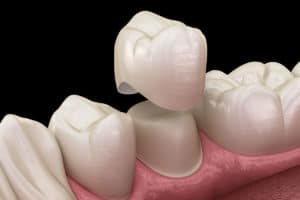Do you have a tooth that is decaying or broken? The good news is that a dental crown from Yamaguchi Family Dentistry in Tumwater could be the answer to saving your tooth.
When a tooth hurts, dental crowns are a time-tested, proven solution that will also improve the appearance of your smile. Additionally, Dr. Garret Yamaguchi recommends a dental crown to protect the top of a dental implant or to support a tooth after a root canal.
What is a Dental Crown?

A dental crown is essentially a replica of a tooth made of porcelain. This cap is placed over a tooth to help restore its shape, strength, and size. A dental crown helps restore the look and function of a tooth damaged by decay or trauma.
The crown replaces the external portion of the tooth down the gum line. It's the part of the tooth you see. Crowns are used in restorative dentistry to:
- Protect a weakened or decaying tooth and help keep it from breaking
- Cover one or more dental implants to replace missing teeth
- Restore a broken or worn tooth
- Support a tooth that has had a large filling
- Reinforce a tooth (or teeth) treated with root canal therapy
- Help hold a dental bridge in place
Dental crowns are simply caps that are put over your teeth. It protects the tooth and aids in the restoration of its form, size, strength, and look. The visible area of the tooth will be covered entirely and encased by this cap.
A dental crown may be required to protect a weakened tooth (or teeth) from breaking or even shattering. A tooth with a large filling, a cracked tooth, or a tooth that has been significantly worn down can all benefit from having a crown cover and support the tooth.
- Maintain placement of a dental bridge
- Cover misshapen or badly stained teeth or to conceal a dental implant.
Dental Crowns for Children
Adults aren't the only ones who may benefit from dental crowns. Crowns on "baby teeth" may be required for children to:
- Salvage a seriously damaged tooth that cannot be filled
- Safeguard teeth at high risk of deterioration
Are Dental Crowns the Right Choice For Me?
Most people are ideal candidates for a new crown. This dental procedure can improve the appearance of a damaged tooth while also restoring the tooth’s natural function. After a dental crown is placed, most patients can enjoy chewing without pain and smile confidently.
To ensure your dental crown is comfortable and matches your natural teeth, Dr. Kaur uses our iTero intraoral digital scanner to create an accurate digital impression of your smile! There's no need for messy, uncomfortable impressions when we can use iTero technology to render a detailed 3D image of your smile.
How Long Will a Crown Last?
Most crowns last between 5 and 15 years. It depends on the wear and tear your teeth are exposed to and if you take care of it with regular brushing and flossing. A crown should be treated like natural teeth, so regular cleanings and checkups are essential.
About Temporary Crowns
A temporary crown is a tooth-shaped cap that protects a natural tooth or implant until your permanent crown can be made and cemented into place.
Because temporary crowns are more delicate than permanent ones, it’s essential to take extra care when flossing or chewing while you have a temporary crown in place.
Dental Bridges
A Dental Bridge spans the space created when someone has missing teeth. A bridge may be recommended if you’re missing one or more teeth.
A dental bridge consists of two crowns on either side of a replacement tooth.
These two crowns are cemented to the abutment teeth or implants on either side of the space and act as anchors for the replacement tooth. As with crowns, you have a choice of materials for bridges. Our dentist can help you decide which to use based on the location of the missing tooth (or teeth), its function, aesthetic considerations and cost. Porcelain or ceramic bridges can be matched to the color of your natural teeth.
Benefits of a Dental Bridge
Gaps left by missing teeth eventually cause the remaining teeth to rotate or shift into empty spaces, resulting in a bad bite.
The imbalance caused by missing teeth can also lead to gum disease and temporomandibular joint (TMJ) disorders.
Dental Bridges are designed to:
- Restore your smile
- Restore your ability to chew and speak properly
- Maintain the shape of your face
- Distribute the forces in your bite properly by replacing missing teeth
- Prevent remaining teeth from drifting out of position
Caring for Your Crowns & Bridgework
Crowns and bridgework require the same conscientious care as your natural teeth. Be sure to brush and floss between all of your teeth — restored and natural — every day to reduce the buildup of dental plaque. When you have crowns, it is even more important to maintain your regular cleanings at the dental office. Avoid using your teeth as tools (to open packages, for example). If you have a grinding habit, wearing a nightguard would be a good idea to protect your teeth and investment.
Schedule Your Appointment at Yamaguchi Family Dentistry
Please fill out the form below and our Scheduling Coordinator will find the best time for your appointment and contact you.
If you have any questions or this is an immediate need, please call us at (360) 943-9480.